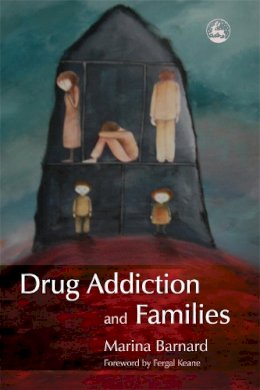
Drug Addiction and Families
Marina Barnard
Drug problems have a profound impact on families. Mothers and fathers, brothers, sisters and children are frequently caught in the maelstrom that drug problems almost inevitably create. Within the UK there is a serious lack of information on the experiences of families attempting to live and cope with a family members' drug problem. Drug Addiction and Families is an exploration of the impact of drug use on families, and of the extent to which current practice meets the needs of families as well as problem drug users.
Drawing on a substantial research study comprising interviews with problem drug users and their extended family, Marina Barnard examines the effects of drug use not only on drug users themselves, but also the feelings of anger, sadness, anxiety, shame and loss that are commonly experienced by their extended family. She records the effects of drug use on family dynamics and relationships, including possible social and emotional costs. Its impact on the physical and mental health of family members is also discussed. The author highlights the often overlooked role of grandparents in protecting the children of drug users and considers the perspectives of practitioners such as teachers, social workers and health professionals. The conclusions drawn point to the fact that current service provision, in treating the problem drug user in isolation, fails to address the needs of drug-affected families, and misses the opportunity to develop family-oriented support and treatment.
This accessible and insightful book is invaluable reading for drug workers, social workers, health professionals and all practitioners working with families affected by drug use.
Product Details
About Marina Barnard
Reviews for Drug Addiction and Families
Mental Health practice Professor Marina Barnard works at the Centre for Drug Misuse Research at the University of Glasgow. In Drug Addiction and Families she has created a powerful book. She uses the words of children and adults and it is difficult not to feel moved by the experiences and feelings expressed, nor to avoid sharing Barnard's frustration at the responses of services. The book examines the impact of drug use on all members of the family including the reactions of parents whose child is using drugs, sibling relationships and the affects of parental drug use on children. In 2003, the Advisory Council on the Misuse of Drugs published Hidden Harm, its watershed report on parental drug misuse. Not only did it raise awareness, but it was also the catalyst for improvements in service provision and inter-agency working. But Barnard argues that it is not just about systems and processes and she believes there is a need to drill down to, and possibly change, assumptions and relationships between practitioners and families. One key assumption is that a parent who misuses drugs is not necessarily a bad parent. However, as Barnard is right to emphasise, we do no help parents or their children if we fail to recognise the potential for their parental capacity to be compromised, and attempts not to stigmatise should not outweigh the need and preparedness to intervene. For this point alone, the book should be compulsory reading for anyone in contact with a member of a family affected by drug use. Families affected by drug abuse can be helped, but the challenge is to ensure the funding and the aspirations of policy are translated into the actions of service providers. As Barnard says, if we fail to help families we should not say we did not know what they were going through. You won't be able to after reading this book.
Children Now Magazine This book is valuable for families living with addiction, to share strategies and experiences... Professor Barnard brings together interview extracts from drug users, their children, siblings, parents and practitioners in what makes for a challenging and powerful read. It provides a stark reminder for a practitioner working with adults that addiction does not only affect the client in front of us. It explores some of the challenges we face - for example, complexities of balancing the therapeutic relationship with child-protection issues. Also considered was the impact of addiction on siblings: how their needs become secondary to that of the user, and potential initiation into drugs from the using sibling. There are also accounts from the extended family, and the role (often unacknowledged) that they play in trying to keep the family together.
Addiction Treatment Today The most common and damaging misunderstanding about drug dependancy is that it only concerns the person using the drugs. If we could just fix the addict then everything else would be alright. It is a perception which not only places enormous pressure on the individual who is dependent on drugs but it also ignores the pain experienced by families and loved ones. One of the first lessons I learned as a recovering alcoholic was that what I considered 'my' problem was in fact a problem for a lot of other people as well. The pain and illness spreads out from the addict to encompass partners, children, siblings and friends. The family can find itself caught in a web of denial, shame, anger and sheer bewilderment as the drug user is pulled away from them by the force of addiction. Marina Barnard has written a powerful book which addresses the crisis faced by families as they attempt to cope with the effects of drug misuse. Her great skill is to blend rigorous research with keen insights and all backed up by a profound humanity. As somebody who knows something of the pain of this territory I cannot recommend her work strongly enough. She both knows and cares - a rare combination in a field where academic studies can too often forget or under-represent the human dimension.
Fergal Keane, Special Correspondent for BBC News
